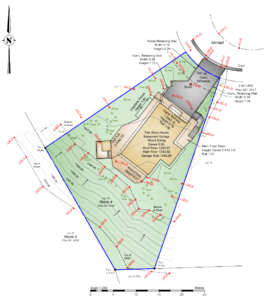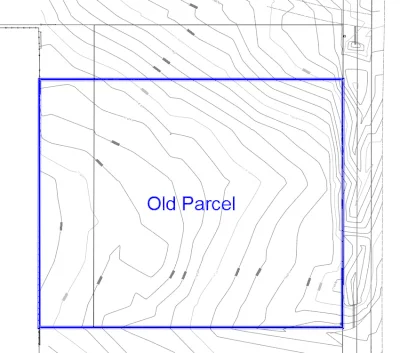Selling a home in Alberta involves more than just staging your property and entertaining offers. One of the most important (and often misunderstood) requirements is the Real Property Report (RPR).
This guide answers the key questions Alberta sellers have about RPRs, such as why lenders and buyers ask for them, what’s required by the City, and what alternative options may be available.
With expertise drawn from Mark Sutter and the Third Rock Geomatics team, you’ll find practical, local guidance tailored for Calgary’s unique market.
When Do You Need an RPR to Sell a House in Alberta?
Knowing when an RPR is required helps you avoid last-minute surprises in your sale. Here is why buyers, lenders, and municipalities ask for one, and what’s expected in a Calgary property transaction.
Why Lenders and Buyers Request a Real Property Report
In every property sale, you’re not just transferring a house. You’re selling a “bundle of rights” attached to your land.
Lenders and buyers request a Real Property Report (RPR) because it’s the only document that clearly shows those rights and any limitations:
- The RPR discloses boundaries, locations of fences and structures, easements and identifies any encroachments which may impact rights adversely.
- Buyers and banks want to see the property is free from concerns, with no hidden issues.
- A detailed RPR lets buyers know exactly what they’re getting and satisfies lenders’ needs. Their investment is protected and aligned with all municipal and legal requirements.
Municipal Requirements for Selling Your Home
Contrary to popular belief, Alberta municipalities, including Calgary, do not impose a direct legal requirement to provide an RPR to sell your home.
However, the process of attaining municipal “compliance” is a critical step in almost all sales contracts. This requires the City to review your RPR and issue a compliance certificate.
- The certificate shows all structures comply with City bylaws and no unapproved encroachments exist.
- Most buyers, realtors, and lawyers consider the compliance stamp essential for a smooth closing.
- Failing to secure a compliance certificate can delay or even derail a sale, as it exposes both the buyer and lender to unknown risks.
What Is a Real Property Report
Let’s break down exactly what an RPR includes and why it’s so critical. This section will help you understand what the report shows and the role it plays in a real estate sale.
Understanding the Purpose of a Real Property Report
A Real Property Report is much more than a map. It’s a legal document prepared by a licensed Alberta Land Surveyor showing all visible improvements (like homes, garages, decks, and sheds) in relation to property boundaries.
The purpose? To put everything “out in the open”:
- Sellers show prospective buyers there are no surprises on the lot (or call out any issues that exist), building trust and transparency in the transaction.
- The RPR checks for boundary accuracy, encroachments, and any third-party interests, whether from neighbours or the City.
- Having a current, accurate RPR is the best way to give everyone peace of mind and is the fastest way to “clear” a real estate deal from a survey perspective.
Preparing to Sell Your Home with an RPR
Selling your home can be a stressful experience, but the process is much smoother when you come prepared.
How a Real Property Report Protects Sellers During Transactions
An RPR is more than a box to tick. Providing an updated RPR to your realtor can fulfill contractual obligations and gives you control over your deal:
- It minimizes opportunities for buyers to back out because of hidden issues.
- When an RPR is disclosed up front, buyers cannot use “lack of disclosure” as an excuse to walk away, making offers more secure and negotiations smoother.
- Ultimately, providing the RPR ensures fewer surprises, reduces last-minute negotiations, and speeds up closing.
Addressing Non-Compliance Issues Before Listing
If your RPR reveals anything that’s non-compliant, such as an unpermitted addition, it becomes a bylaw violation; those issues should be addressed before listing.
Work with your surveyor and realtor to resolve non-compliance issues. Obtaining a municipal compliance certificate by applying for bylaw relaxation or correcting/removing non-compliant structures are means a Land Surveyor can assist you with.
Proactive problem-solving earns buyer trust and can stop a sale from falling apart during the conditional period.
Alternatives to an RPR When Selling Property in Alberta
If you don’t have an updated RPR, you might wonder if other options exist. The only recognized alternative to an RPR in an Alberta property sale is title insurance.
Can Title Insurance Replace a Real Property Report?
Title insurance is an American product that originated because the U.S. does not have centralized land titles offices. There, property ownership is often proven with documents held by insurance companies or lawyers, which means there are more ways someone could lose their land, such as through fraud, lost paperwork, or poor record-keeping. Insurance acts as a safeguard.
In Alberta, our land titles system already provides this kind of protection by guaranteeing ownership through a central registry.
Here’s what you need to know about title insurance in Calgary:
- It is designed primarily to protect against losses from land title problems, fraud, or missing documents — not to verify boundaries or improvements.
- While some lenders may accept title insurance (especially to protect their interests), it’s not a true substitute for the information provided by an RPR.
- Title insurance only protects against loss of rights. It can’t resolve municipal non-compliance or prevent disputes about land boundaries or encroachments discovered later.
- If the seller or purchaser is aware of an issue (e.g., a bylaw infraction or an encroachment), use of title insurance may not be valid or allowed.
Bottom line: In Alberta, title insurance is sometimes used as a gap remedy, but it doesn’t offer the detailed property analysis, peace of mind, or legal certainty of an up-to-date Real Property Report.
How to Obtain a Real Property Report in Alberta
Getting an RPR is a straightforward process when you work with a trusted surveyor. Here is an overview of what to expect:
Steps Involved in Creating an Accurate Real Property Report
- Order Your RPR: Choose a reputable land surveyor (like Third Rock Geomatics) and provide your property details.
- Field Survey: A survey crew visits your property to measure boundaries, document all permanent structures, and check for visible encroachments.
- Drafting the Report: Surveyors create the RPR, double-checking all data against land titles and municipal records.
- Review & Signing: The finalized report is reviewed for accuracy and signed/certified by a licensed Alberta Land Surveyor.
- Delivery and Municipal Submission: The RPR can then be submitted to the City for a compliance certificate.
- Compliance Review: The City’s response may include a compliance stamp, an encroachment advisory (EA), or a requirement for a development permit (DP).
Tip: Order your RPR as soon as you are considering selling, not just when a deal is pending.
Third Rock Geomatics completes most RPRs within 3–5 business days, including submission to the city for compliance review.
What You Should Know About RPRs in Alberta
There are a few important RPR facts to keep in mind, especially when it comes to updates, acceptance, and compliance. We’ll cover the essentials so you can make informed decisions.
- An RPR “ages” as soon as it’s signed. Additions, new fences, deck expansions, or even neighbouring construction may require an updated report before sale.
- Always check whether your lender or buyer’s lawyer will accept a previously issued RPR or require a new one.
- Not all RPRs are created equal. Choose a licensed Alberta Land Surveyor with a reputation for producing clear, detailed, and compliant reports in a timely fashion.
Working with Professional Land Surveyors for Your RPR
Third Rock Geomatics has been Calgary’s trusted provider of Real Property Reports for years. Here’s why property owners, realtors, and lawyers choose Third Rock:
- Speed: We deliver RPRs within 3–5 business days. We use a digital process to produce RPRs quickly while ensuring the highest level of accuracy.
- Clarity: Our easy-to-read, user-friendly documentation satisfies City requirements and takes the stress out of your sale.
- Communication: Benefit from full transparency, fixed pricing, and direct support from a licensed Alberta Land Surveyor throughout the process.
Don’t leave your home sale to chance or risk a deal falling through. Contact us today for fast, expert help with your Real Property Report in Calgary.
This resource is intended to inform Alberta homeowners and sellers about RPR requirements. For advice about your unique property or transaction details, speak with a qualified land surveyor or your real estate lawyer.





